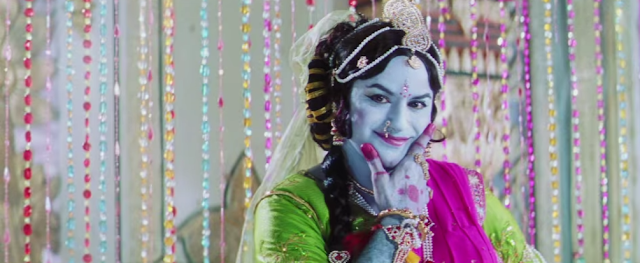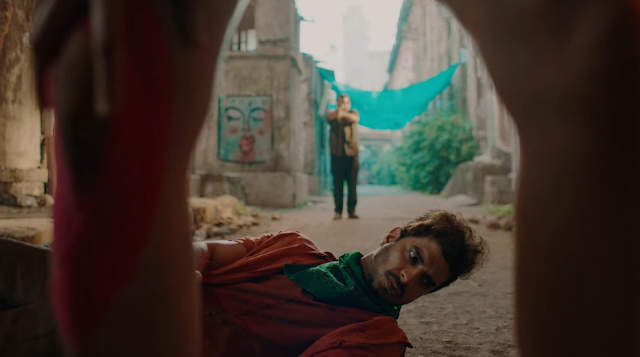The Indian film industry used to have a . . . relaxed attitude toward intellectual property, freely lifting songs, scenes, dialogues, and sometimes entire movie plots from international sources, because who's going to check? That sometimes leads audiences to overcorrect and declare a movie a ripoff if the plot or even the premise bears a superficial resemblance to a Hollywood movie, but I am very comfortable in saying that Pyaar To Hona Hi Tha (1998) is a shameless copy of 1993's French Kiss, and I am not just saying that because of Ajay Devgn's spiffy Kevin Kline mustache.
Sanjana (Kajol) lives alone in Paris. She's quirky and clumsy and terrified of air travel, which will be important later. She's also an orphan, but she is engaged to Rahul (Bijay Anand) for reasons which probably make sense to her; even this early in the film he's dreadful Still, Sanjana has saved up enough money to buy them a small house, which will also be important later.
And then Rahul has to travel to India for business. Sanjana is supposed to join him, but her fear of flying is so bad that she gets kicked off the plane instead, and Rahul goes on alone. A week later he calls Sanjana and tells her that it's over, he's in love with someone named Nisha (kashmera Shah), and he's never ever going back to France. Which means that Sanjana needs to conquer her fears and fly to India!
She tries, but sitting in her seat in the surprisingly spacious and comfortable plane (air travel has really changed since 1998) she starts panicking until Shekhar (Ajay Devgn), the man who happens to be in the seat next to her, starts an argument which distracts her long enough for the plane to take off, and then, since this is Bollywood, leads the passengers in a chaotic musical number to distract them when the plane encounters turbulence, pausing just long enough to see Yamaraj the God of Death on the wing of the plane.
Shekhar has his own problem - he's a thief, returning to India after stealing a priceless diamond necklace. (Well, not really priceless, but expensive.) He's hidden the necklace in a small houseplant, which makes no sense in this context; it's a detail lifted from French Kiss, but Kevin Kline's character was from a family of vintners and hid the necklace in a grape vine which he had a reason to be transporting. Obviously Shekhar's friendly nemesis Inspector Khan (Om Puri) is at the airport, and obviously Shekhar hides the plant in Sanjana's bag, and obviously after failing to meet Rahul at his hotel Sanjana's luggage is stolen so Shekhar has to help her try to get it back.
By the time they track down the thief, Sanjana's money is gone, and so is most of her luggage. She finds her handbag, but Shekhar doesn't find the plant. He needs to stick with Sanjana until he can figure out if she has his precious necklace, so he offers to help her win Rahul back by pretending to be her boyfriend and making Rahul jealous. Rahul and Nisha have moved on to a beachside resort, so it's time for a roadtrip, but first they stop in Shekhar's village, where she meets his wonderful family and learns his sympathetic backstory.
If you have ever seen a movie before (and especially if that movie is French Kiss) then you know how this is going to go; Sanjana will realize that Rahul is a vile little toad of a man and start to develop feelings for Shekhar, Shekhar will discover that he loves Sanjana, and one or both will wind up sacrificing their love in order to make the other one happy. It's the details that matter.
Kajol is always great and this movie plays well into her talents. She sparkles in the comedy bits early in the film, then carries the dramatic load later in the movie when the romance plotline takes over. She's so good in this movie, in fact, that she was nominated for a Filmfare award for the role, only to lose out to . . . Kajol in Kuch Kuch Hota Hai. (There were five nominees for Best Actress that year, and three of them were Kajol.)
Ajay Devgn, on the other hand, is better known as an action star than as a comedian or romantic lead, but he does suit the role of dashing rogue well, and the filmmakers have added action scenes to showcase his talents and allow Shekhar to crash cars and beat up masked gunmen.
Translating a story from America to India can be tricky, though it helps if you have a relaxed attitude toward intellectual property. Pyaar To Hona Hi Tha isn't perfect, but it makes the transition well.

.png)
.png)
.png)
.png)
.png)
.png)
.png)
.png)
.png)
.png)
.png)
.png)
.png)
.png)
.png)
.png)
.png)
.png)










